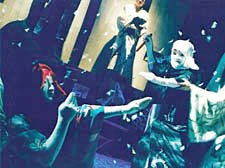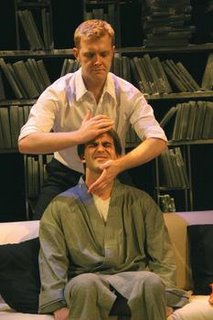
As she let people into a Camden winter shelter, Linda Warwick was threatened by a man not on her list, on Sunday night.
The man shouted at her that he would blow off the door if she didn’t let him in to St Michael’s church hall. Linda, the coordinator of the Camden churches’ winter shelter scheme, handled the situation calmly, advising him to contact the Spectrum Day Centre to find out how to get on the scheme.
Cold weather shelters for the homeless have been set up by Camden churches since the start of January. Seven churches each provide free supper, a bed and breakfast, to homeless people, one night a week.
Only 13 people are allowed on the scheme at any one time, due to the limited space in churches. This compares to 350 rough sleepers who were contacted by outreach teams in Camden last year.
Linda says that the threat of violence is unusual. “We try to be firm, only allowing thirteen people. It’s sad when people queue and we can’t let them in,” she adds.
Imogen Black, pastoral assistant at St Michael’s Church, who helps run the Sunday night shelter, says, “It’s difficult as there are so many people we can’t take on.”
More than a dozen people volunteer to help there each week. “We’re well placed for volunteers. There’s a limit on what they can do,” she says.
Mandy Fernie, 42, and Marie Cafferkey, 55, who help at the Sunday shelter, eat, play scrabble and stay overnight with the homeless people.
“We just mix with the homeless like they were one of us. They’ve come from all backgrounds. We’ve had ex nurses and teachers. The shelter allows people to rest. It helps them to get their heads together and sort themselves out,” Marie says.
The homeless people have to leave the shelter by 9am. They will be put up in another church from 7.30 that evening. “People have to leave by nine as the churches are used for other purposes in the day,” says Imogen.
Linda says that each church only takes the homeless people for one day in a row as “volunteers are more able to commit to one day a week.”
As for what the homeless people can do in the day, the Spectrum Day Centre is open. However, people can only stay there for two hours at a time. The rest of their time is mainly spent on streets. Two people have started attending college. Appointments are also set up with the scheme’s advocate worker, Rory Welks, who gives guidance helping people look for jobs and accommodation.
Homeless agencies, such as the Spectrum Centre, put forward people to go on the scheme. People of any age, race, creed and sex are accepted. "We won't ask people what they believe in. One man on the scheme is a Muslim,” Imogen says.
One female was at the Sunday night shelter. The remainder were all 20 to 50-year-old males. Linda comments on why there are more homeless men than women, saying, “Men are less likely to ask for assistance, due to a sense of pride.”
Homeless people sign an agreement to say they will not indulge in drinking, drugs or anti-social behaviour, before entering the shelter. "We don't discriminate against people with drink and drugs problems. However, drink or drugs aren’t allowed in the churches. These good behaviour conditions make things safer for the homeless and volunteers,” Imogen says.
Drug users will be offered help. "We offer an experienced listening ear," Imogen adds. However, two people were kicked out of the shelter for anti social behaviour this month.
People are allowed on the scheme for a maximum of 28 days. However “in certain situations, if we need to give people extensions, we will,” says Linda.
When asked why the scheme only runs from January. "At Christmas, there are agencies that help people. We set up homeless shelters, between January and March, as homeless people have less help then,” Imogen explains.
Ken Scott had been homeless for two years before he was accepted onto last years winter shelter scheme. “I didn’t need to worry where my next meal was coming from. Because they provided the basics, I could focus on my life and sort out my priorities,” he says.
He was referred to permanent accommodation by contacts he made at the shelter. He now volunteers on the scheme, helping on the Saturday night shelter.
Ken, who has done an eight week key worker course, hopes to gain a full time job helping the homeless in the spring.
The scheme runs until 31 March.










 For Londoners, so used to delayed tube trains and disappointment, the news seemed too good to be true. We thought, could this be the start of a new golden era for the city?
For Londoners, so used to delayed tube trains and disappointment, the news seemed too good to be true. We thought, could this be the start of a new golden era for the city? A second series of tube and bus explosions on 21 July, where the explosive charges failed to detonate, warned Londoners that 7 July was not a one-off.
A second series of tube and bus explosions on 21 July, where the explosive charges failed to detonate, warned Londoners that 7 July was not a one-off.

